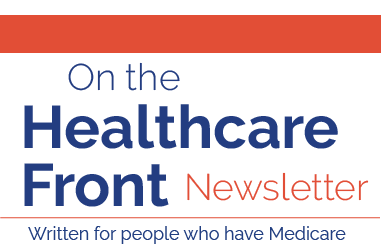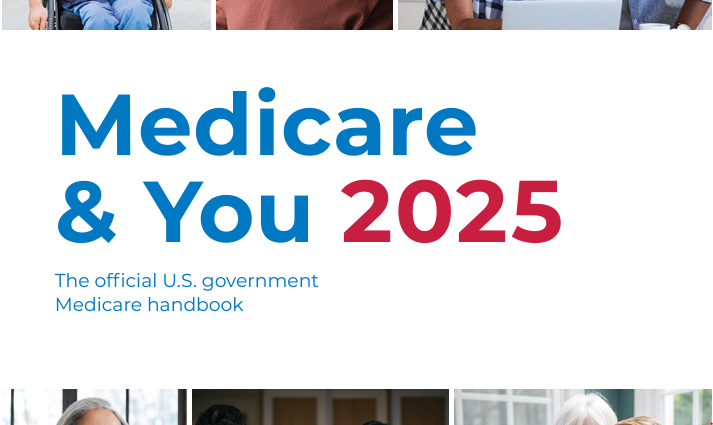
|
Issue #41 September 2025 Newsletter issues will tell you about Acentra Health’s free services for people who have Medicare as well as information from Medicare and other health-related tips. Do you receive email reminders when new issues of On the Healthcare Front are published? |
when should you call acentra health?
- If you are not ready to be discharged from the hospital.
- If your Medicare-covered skilled services are ending too soon. Examples of skilled services include things like physical therapy and nursing services.
- If you have a concern about the quality of care you received.
- If you have a concern about your medical care that needs to be taken care of right away.
Click on the button below for the phone number for your state. These services are free for people who have Medicare.

coming soon: your medicare & you handbook
If you have Medicare, you’ll be getting the 2026 edition of the Medicare & You handbook in the mail starting in late September. This guide is mailed out each year to help you stay informed about your benefits, plan options, and rights.
It’s a good idea to hold on to your copy. You can use it as a reference during Medicare Open Enrollment, which runs from October 15 to December 7. During this time, you can make changes to your coverage for the year ahead.
Prefer to read it online? You can also view or download the handbook as soon as it’s available at www.medicare.gov/medicare-and-you.
The handbook is free and available in English, Spanish, large print, audio, and Braille.
|
Be sure to check your mailbox and then check back with us next month. In the October issue of this newsletter, we’ll share tips and tools to help you feel confident about your healthcare choices during Open Enrollment. |

get ready for flu day on september 16
September isn’t just about leaves changing. On September 16, we observe Get Ready for Flu Day.
This is a great prompt to check in with your doctor or pharmacist about getting your flu shot. Your flu shot is covered by Medicare, so there’s no cost to you. If you have a Medicare Advantage plan, check with your individual plan for details about coverage. Visit our Flu page for more information about flu, including where you can get a flu show this year.
September is also National Preparedness Month, and that includes staying ready for emergencies, especially during Atlantic hurricane season, which runs from June through November. Whether it’s making sure your prescriptions are current or having an emergency contact list nearby, a little planning goes a long way.
|
More Information
|
in this issue |
don't keep this a secret
Share this newsletter with friends who have Medicare by sharing this link: www.acentraqio.com/ohf/September2025
getting to know your medicare rights
a new article series
When it comes to your health care, you deserve to know your rights and feel confident in using them. Acentra Health’s new article series is here to help.
Each month, you’ll find a short article with helpful, easy-to-understand facts about the rights you have as someone with Medicare. Our goal is to help you feel more prepared, informed, and supported whenever you’re getting care.
We’ll cover real-life situations.
We’ll also explain how Acentra Health can help you take action quickly at no cost to you.
You don’t need to know all the rules. That’s what we’re here for. Let’s start by talking about something many people don’t realize they can do: appeal a hospital discharge.
what to do if you are told to leave the hospital too soon
 You’ve just had surgery—maybe a knee replacement or a hip replacement. Or maybe you were in the hospital because of a fall, a breathing problem, or a serious infection. You're starting to feel a little better, but you're not quite back to yourself.
You’ve just had surgery—maybe a knee replacement or a hip replacement. Or maybe you were in the hospital because of a fall, a breathing problem, or a serious infection. You're starting to feel a little better, but you're not quite back to yourself.
Or maybe you're not in the hospital yet—but you're planning for a surgery in the near future. If that’s the case, this is important information to know ahead of time. Knowing your Medicare rights now can help you feel more prepared later, especially if you’re ever told it’s time to leave the hospital and don’t feel ready.
Medicare gives you the right to ask for a second look at that decision. That second look is called an appeal. It’s your chance to say, “I’m not sure I’m ready to go home,” and have someone outside the hospital review your case.
When the hospital decides to discharge you, they’re required to give you a paper called the Important Message from Medicare. This notice tells you the date you’re scheduled to leave and how to ask for a fast appeal if you think you're being discharged too soon.
We know that when you’re in the hospital, you’re handed a lot of paperwork. Sometimes, it can be more than you can keep up with. It’s easy to feel overwhelmed or to set it aside. However, some of those documents contain important information about your rights, including how to appeal a discharge.
Please take the time to read through everything you’re given. If something doesn’t make sense, ask someone to explain it. You have the right to understand your care and paperwork.
Whether you have Original Medicare or a Medicare Advantage plan, the process for filing this type of appeal is the same. Follow the instructions on your Medicare notice. It will tell you how to contact Acentra Health and start your appeal. Acentra Health serves as Medicare’s BFCC-QIO, which stands for Beneficiary and Family Centered Care Quality Improvement Organization. That’s a long name, but here’s what it means: we’re here to help people with Medicare understand their rights and take action when something doesn’t feel right.
When you contact us, we begin the process. A doctor, who isn’t a part of the hospital, reviews your medical records and makes an independent decision about whether you’re ready to go home. This review usually happens within one day. While the appeal is being reviewed, you can stay in the hospital, and Medicare will continue to pay for your care.
No need to second-guess or go through the process alone. Just give us a call. We’ll walk you through it, make it simple, and help you feel confident about what comes next. This service is free for everyone who has Medicare. You can find the phone number for your state on our Beneficiary Helpline page.
|
More Information To learn more about Medicare appeals, visit www.medicare.gov/claims-appeals. Think someone else could use this info? Watch a video: Learn about Your Medicare Rights |
september: healthy aging is about living life on your terms

In last month’s issue, we talked about how retirement is changing. Some people are continuing to work part-time. Others are focusing on caregiving, creative projects, travel, or simply choosing how to spend their time in ways that feel meaningful.
This month, we’re continuing that conversation with a closer look at what it means to age well.
What does aging well mean to you? You’ve probably heard the phrase “healthy aging” before. It shows up on magazine covers, in health articles, and on checklists from doctors. But let’s be honest. It can sometimes feel like just another list of things to do. Eat this, stretch that, don’t forget your vitamins.
That’s not what we’re talking about here.
Healthy aging doesn’t mean doing everything right. It doesn’t mean looking younger than you are. And it certainly doesn’t mean following someone else’s idea of what life “should” look like. What it really means is paying attention to what matters to you and making choices that support the life you want to live.
That might mean checking in on your health more regularly. Some good news is that you can visit our Healthy Aging page to do that. It might mean setting boundaries or saying no to things that no longer fit. You could also start something new, whether it’s a class, a hobby, or a commitment to taking better care of yourself.
The point is that you get to decide what aging well looks like in your life. You’re the expert on your own priorities, values, and goals. You’ve earned the right to shape this next chapter in a way that feels true to who you are.
|
More Information Medicare covers an annual wellness visit at no cost to you. You can learn more at www.medicare.gov/wellnessvisit. The National Institute on Aging (NIA) is a trusted source for aging-related health topics, including brain health, nutrition, and caregiving. Learn more at https://www.nia.nih.gov/health. |
Publication No. R146810-202-9/2025. This material was prepared by Acentra Health, a Medicare Quality Improvement Organization under contract with the Centers for Medicare & Medicaid Services (CMS), an agency of the U.S. Department of Health and Human Services. The contents presented do not necessarily reflect CMS policy.




